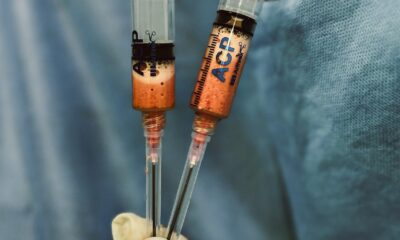Cognitive Decline
Understanding Early Onset Dementia: Causes, Symptoms, and Treatment
Understanding Early Onset Dementia: Causes, Symptoms, and Treatment. Explore the topic and gain a comprehensive understanding of this condition.
Have you ever wondered about the causes, symptoms, and treatment options for early onset dementia? In this article, we will explore this topic and provide you with a clear understanding of the condition. Early onset dementia can have a significant impact on individuals and their loved ones, so it is crucial to have a comprehensive understanding of the condition. By delving into the causes, symptoms, and available treatment options, we aim to provide you with the knowledge necessary to navigate this challenging journey. Let’s get started and gain a deeper insight into early onset dementia.
What is Early Onset Dementia?
Early onset dementia refers to the development of dementia symptoms in individuals who are under the age of 65. While dementia is often associated with older adults, early onset dementia can have a significant impact on individuals in their prime years. This condition affects cognitive functioning, including memory, thinking, and behavior, which gradually worsens over time. It is essential to understand the causes, symptoms, and treatment options for early onset dementia to provide appropriate support for individuals and their caregivers.
Definition of Early Onset Dementia
Early onset dementia is characterized by the onset of dementia symptoms before the age of 65. The most common type of early onset dementia is Alzheimer’s disease, accounting for approximately 50-60% of cases. However, other types of dementia, such as frontotemporal dementia, Lewy body dementia, and vascular dementia, can also manifest in younger individuals. The challenges faced by those with early onset dementia differ from those experienced by older adults, as they often have greater responsibilities both at work and in their personal lives.
Difference between Early Onset Dementia and Alzheimer’s Disease
While Alzheimer’s disease is the most common form of early onset dementia, it is important to note that not all cases of early onset dementia are solely due to Alzheimer’s. Early onset dementia encompasses a broader range of conditions, each with its unique characteristics and progression patterns. Alzheimer’s disease primarily affects memory and thinking abilities, gradually leading to a decline in daily functioning. Other types of early onset dementia may present with different symptoms, such as changes in behavior, language, or motor skills. Understanding the specific type of dementia is crucial for tailored interventions and support.
Prevalence of Early Onset Dementia
Early onset dementia is considered relatively rare compared to late-onset dementia. Estimates suggest that approximately 5-10% of all dementia cases occur in individuals under the age of 65. However, this percentage still reflects a significant number of individuals around the world. Early onset dementia can impact individuals from diverse backgrounds and can occur in both men and women. As awareness and early detection improve, it is anticipated that the prevalence of early onset dementia may become more accurately estimated.
Causes of Early Onset Dementia
Genetic Factors
Some cases of early onset dementia have a genetic basis. Mutations in certain genes, such as the amyloid precursor protein (APP), presenilin 1 (PSEN1), and presenilin 2 (PSEN2) genes, can lead to the early development of Alzheimer’s disease. Genetic testing may be recommended for individuals with a family history of early onset dementia to identify potential risk factors.
Inherited and Familial Dementia
Inherited forms of early onset dementia are typically due to autosomal dominant mutations. These mutations significantly increase an individual’s risk of developing dementia. Familial frontotemporal dementia and familial Alzheimer’s disease are two examples of inherited forms of early onset dementia. Understanding the family history can provide valuable insights and help in early identification and intervention.
Environmental Factors
Exposure to certain environmental factors may contribute to the development of early onset dementia. Prolonged exposure to toxins, such as heavy metals or industrial chemicals, may increase the risk of cognitive decline. Additionally, repetitive head injuries, such as those experienced in contact sports or military service, have been associated with an increased risk of developing dementia at a younger age.
Lifestyle Factors
Certain lifestyle factors can influence the risk of developing early onset dementia. Chronic conditions like hypertension, diabetes, and obesity have been linked to an increased risk of cognitive decline. Additionally, an unhealthy diet, lack of physical exercise, smoking, and substance abuse can further contribute to the development and progression of early onset dementia. Adopting a healthy lifestyle that includes regular exercise, a balanced diet, and avoidance of harmful substances can help reduce the risk of cognitive decline.

Risk Factors for Early Onset Dementia
Age
While early onset dementia can occur at any age, the risk increases with advancing age. The majority of cases occur in individuals between the ages of 40 and 64. As individuals get older, the chances of developing cognitive decline naturally increase, and the impact of genetic and environmental factors may become more apparent.
Family History
A family history of early onset dementia significantly increases the risk of developing the condition. Inherited forms of dementia can be passed down through generations, leading to a higher likelihood of an individual being affected. Genetic counseling and testing may be recommended for individuals with a family history of early onset dementia to assess the risk accurately.
Head Trauma
Severe head trauma, such as that resulting from car accidents, falls, or sports-related injuries, has been associated with an increased risk of early onset dementia. Traumatic brain injuries can cause long-term damage to the brain, disrupting cognitive functions and potentially leading to the development of dementia symptoms.
Medical Conditions
Certain medical conditions can contribute to the risk of developing early onset dementia. Chronic conditions like cardiovascular disease, diabetes, and hypertension have been associated with an increased likelihood of cognitive decline. Managing these conditions effectively through medication and lifestyle modifications can help reduce the risk.
Smoking and Substance Abuse
Both smoking and substance abuse, particularly alcohol and illicit drugs, have been linked to an increased risk of early onset dementia. These harmful behaviors can cause damage to the brain over time, leading to cognitive decline and an earlier onset of dementia symptoms. Quitting smoking and seeking support for substance abuse can have significant benefits for brain health.
Recognizing Symptoms of Early Onset Dementia
Cognitive Symptoms
Early onset dementia initially manifests as subtle cognitive changes. These can include difficulties with memory, attention, and problem-solving abilities. Individuals may have trouble recalling recent events, forget important details, or struggle to follow conversations or instructions. They may experience a decline in their ability to plan and organize tasks effectively.
Behavioral and Psychological Symptoms
Changes in behavior and personality are common in early onset dementia. Individuals may exhibit mood swings, irritability, or apathy. They may also withdraw from previously enjoyed activities or social engagements. Personality changes, such as increased impulsivity, inappropriate behavior, or loss of empathy, can also occur.
Physical Symptoms
Physical symptoms may accompany early onset dementia, although they are generally less prominent compared to cognitive and behavioral changes. Motor difficulties, such as clumsiness or unsteady gait, may be observed. In later stages of the condition, individuals may experience difficulties with balance, coordination, and mobility.
Diagnosis and Assessment
Medical History and Physical Examination
Diagnosing early onset dementia typically involves a comprehensive assessment by a healthcare professional. This includes obtaining a detailed medical history, evaluating current symptoms, and conducting a physical examination. The medical history may also involve discussions with family members to gather information about the progression of symptoms and any underlying genetic factors.
Cognitive and Memory Testing
Cognitive and memory tests are essential components of the diagnostic process for early onset dementia. These assessments evaluate various cognitive domains, including memory, attention, language, and executive functioning. Common tests include the Mini-Mental State Examination (MMSE) and the Montreal Cognitive Assessment (MoCA), among others.
Neurological Examination
A neurological examination helps assess motor function, reflexes, and sensory responses to identify any underlying neurological issues that may be contributing to cognitive decline. The examination may involve evaluating coordination, strength, sensation, and reflexes, as well as assessing eye movements and balance.
Brain Imaging
Brain imaging techniques such as magnetic resonance imaging (MRI) or computed tomography (CT) scans may be used to detect any structural abnormalities or changes in the brain associated with dementia. These images can help rule out other potential causes of cognitive decline and provide additional information for diagnosis and treatment planning.
Laboratory Tests
Laboratory tests, including blood tests, may be conducted to evaluate overall health and exclude other contributing factors to cognitive decline. These tests can help identify any underlying medical conditions or nutritional deficiencies that may be exacerbating the symptoms of early onset dementia.
Treatment Options for Early Onset Dementia
Medication
Medication can play a crucial role in managing the symptoms of early onset dementia. While there is currently no cure for dementia, certain medications can help slow down the progression of symptoms and improve quality of life. Cholinesterase inhibitors, such as donepezil, rivastigmine, and galantamine, are commonly prescribed to enhance cognitive functioning and temporarily alleviate memory and thinking difficulties.
Non-Pharmacological Interventions
Non-pharmacological interventions focus on enhancing daily functioning, promoting mental and social engagement, and improving overall well-being. These interventions may include cognitive stimulation therapy, structured physical exercise programs, and activities that encourage socialization and meaningful interactions. Occupational therapy and speech therapy can also be beneficial in managing specific symptoms and maintaining independence.
Supportive Therapies
Supportive therapies, such as counseling or psychotherapy, can help individuals and their caregivers cope with the emotional and psychological challenges associated with early onset dementia. These therapies provide a safe and supportive environment for expression, education, and skill-building, ultimately enhancing overall psychological well-being and quality of life.
Management of Symptoms
Managing the symptoms of early onset dementia requires a comprehensive approach. This may involve addressing sleep disturbances, modifying the environment for safety, and implementing strategies to manage behavioral and psychological symptoms. Individualized care plans and support systems can assist in navigating the challenges faced by individuals with early onset dementia and their caregivers.
Clinical Trials and Research
Ongoing research and clinical trials are critical in advancing our understanding of early onset dementia and developing innovative treatment options. Participation in clinical trials allows individuals to contribute to the advancement of knowledge and gain access to potential breakthrough treatments. Discussing clinical trial options with healthcare professionals can provide valuable insights into the latest research advancements and potential opportunities for personalized treatment.
Coping Strategies for Individuals and Caregivers
Promoting Independence and Quality of Life
Maintaining independence and quality of life is essential for individuals with early onset dementia. Encouraging engagement in activities and hobbies that align with their abilities and interests can provide a sense of purpose and fulfillment. Adaptations and assistive devices can also help support independence in daily activities, such as using memory aids or implementing simple organizational systems.
Creating a Structured Environment
Establishing a structured environment can help individuals with early onset dementia navigate daily routines more easily. Consistency and predictability can reduce anxiety and confusion. This can be achieved through creating visual schedules, maintaining a familiar and organized physical space, and providing clear and concise instructions or reminders.
Ensuring Safety and Well-being
Ensuring the safety and well-being of individuals with early onset dementia is paramount. Implementing safety measures, such as securing hazardous items and installing appropriate locks or alarms, can help prevent accidents or wandering. Regular monitoring of physical health, medication management, and maintaining a healthy lifestyle can also contribute to overall well-being.
Seeking Support and Education
Seeking support and education is crucial for both individuals with early onset dementia and their caregivers. Support groups provide a network of individuals who understand the challenges and can offer emotional support and practical advice. Educating oneself about the condition, available resources, and coping strategies can empower individuals and caregivers to navigate the journey more confidently.
Caregiver Challenges and Resources
Managing Emotional and Physical Stress
Caring for someone with early onset dementia can be emotionally and physically demanding. Caregivers may experience feelings of guilt, grief, and frustration. Managing these emotions through self-care, seeking professional help, and connecting with support networks can help alleviate the burden. Engaging in stress-reduction techniques, such as exercise, meditation, or therapy, is essential for maintaining caregiver well-being.
Support Networks and Respite Care
Establishing support networks and utilizing respite care is crucial for caregivers of individuals with early onset dementia. Joining caregiver support groups or online forums can provide a sense of community and a platform to share experiences and advice. Respite care services, such as in-home care or adult day programs, offer caregivers the opportunity to take breaks, attend to their own needs, and recharge.
Financial Planning and Legal Matters
Early onset dementia can pose significant financial challenges for individuals and their caregivers. It is important to engage in financial planning early on to ensure appropriate financial resources are available. Seeking guidance from financial advisors or elder law attorneys can help navigate legal matters, such as obtaining power of attorney or establishing a living will.
Community and Online Resources
Communities often have resources available to support individuals with early onset dementia and their caregivers. Local Alzheimer’s organizations, community centers, and healthcare providers can provide information on available support services, educational programs, and financial assistance. Online resources, such as websites, forums, and educational materials, can also serve as valuable sources of information and support.
Future Outlook and Research Advancements
Advancements in Early Detection
Advancements in technology and research hold promising prospects for early detection of dementia. Biomarker studies and neuroimaging techniques are being explored to identify early signs of cognitive decline, even before symptoms become apparent. Early detection allows for timely interventions and personalized treatment approaches, enhancing the potential for improved outcomes.
Potential Treatment Breakthroughs
Ongoing research aims to develop new treatment strategies to halt or reverse the progression of early onset dementia. Clinical trials investigating novel medications, immunotherapies, and other therapeutic interventions are at the forefront of breakthrough discoveries. Collaborative efforts among researchers, pharmaceutical companies, and healthcare providers are crucial in expediting treatment advancements.
Global Collaboration and Research Initiatives
Global collaboration is essential in addressing the challenges posed by early onset dementia. International research networks and partnerships foster information sharing and collaborative efforts to advance knowledge and treatment options. By pooling resources, expertise, and data, researchers can work together towards developing effective strategies for early diagnosis, treatment, and support.
Conclusion
Understanding the impact of early onset dementia and its unique challenges is vital for providing appropriate care and support. Advocacy and awareness efforts must continue to ensure that individuals with early onset dementia receive timely diagnosis, intervention, and support. Early recognition and intervention significantly impact the quality of life for individuals and their caregivers, highlighting the importance of ongoing research, education, and global collaboration in addressing this condition. By working together, we can enhance the lives of those affected by early onset dementia and strive for a future with better treatment options and improved outcomes.
















